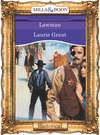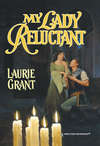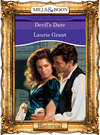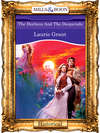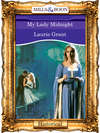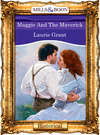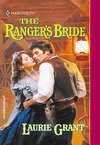Kitabı oku: «Lawman», sayfa 2
The post office was just a small frame building, hardly big enough for the clerk and three chattering ladies who occupied it, two of whom were enormously fat and identical in all respects, including the number of chins they possessed. The Goodlet twins? Sam had told him back in Abilene how the twins were no longer the buxom charmers who’d once competed for his attention.
Conversation ceased as he entered the post office. “Good morning, ladies,” he said, bowing before stepping up to the counter, where the clerk favored him with a basilisk glare.
The third woman put a net-gloved hand up to her mouth as if Beelzebub had just spoken to her.
“Well, I never,” murmured one of the twins.
“The nerve of some people!” sputtered the other, setting her chins wagging.
Cal smiled grimly at the Wanted poster on the wall, suppressing the urge to ask Leticia what she’d “never” and Alicia whether she meant he’d had a lot of nerve not to be dead.
“What do you want, mister?” demanded the goggle-eyed clerk, his Adam’s apple bobbing up and down. It was as if he hadn’t been the prize pupil in Cal’s catechism class before the war.
‘’Nothing much,” he said pleasantly. “Just wanted to see if my sister-in-law, Mercy Devlin, had any mail waiting.”
The clerk looked through a stack of letters. “Yup. Here,” he said, shoving one of them across the counter at him, then staring pointedly toward the door.
Cal took the hint, feeling the women’s eyes on him all the way out the door and hearing the buzz of talk begin once he was safely out of the building. On to the mercantile, then. Since it was just three short blocks, he left Goliad tied to the post-office hitching post.
He passed the Bonny Blue Flag Saloon, remembering that it had been merely the Bryan Saloon before the war. He was thirsty, but kept on walking. Maybe he’d stop in after he was done with his errand. Stepping off the plank sidewalk and into the dusty street to allow two more ladies to pass, he tipped his hat, but they merely stuck their noses in the air and sailed on, their bustles sending their skirts billowing in their wakes.
Sitting on a weathered bench outside the Bryan Mercantile and Emporium was a trio of idlers.
“Well, if it ain’t the prodigal son, returned from the dead,” began one, whom Cal recognized as the livery owner, a man who had never darkened the door of the Episcopal church, nor, it was well known, of the Baptist church, either.
“Eww, I thought I smelled something” jeered another man, stopping his whittling to eye Cal.
“You did, Asa. A no-good skunk,” the third man chimed in.
“Good day, gentlemen,” Cal said evenly, and went on in. He heard the creak of the boardwalk as they rose to follow him. Apparently he wasn’t even going to be allowed to purchase Annie’s thread in peace.
As his sight adjusted to the dim interior of the mercantile, he noticed a pair of ladies studying a bolt of blue calico. He nodded to them, hearing one of them gasp as he turned toward the proprietor. The latter was standing behind the counter, favoring him with the glare Cal was now becoming all too familiar with.
“What do you want?” the man said.
“Just some yellow thread for my sister, Mr. Ames.”
“Yella? He wants yella thread, did you hear that, Asa? Ain’t that the appropriate color fer him t’buy?” chortled one of the idlers behind him.
“What kind of yellow, Devlin? We got two-three shades here,” the proprietor said, fishing around in a case and holding out several hanks of thread.
“Oh, I expect he’ll take coward yella!” the liveryman announced, before Cal could say anything.
Cal felt his temper fraying. He didn’t want to raise a ruckus, not in a store or in front of ladies, but he didn’t think this trio of no-goods was going to be content to let him go without one. He knew as a man of the cloth, even an unemployed one, he ought to just continue to ignore them, but he wasn’t sure how long he could. Turning his cheek had never been his strong suit.
“I’ll take that one,” he said, pointing at random to a hank of thread the color of the daffodils that came up in February here. He laid a five-cent piece on the counter, not even waiting to see if he had paid too much. He just wanted to get out of there before these idlers made him do something ugly in the confines of the store.
“Bill, I guess he’s too yella to say anythin’ to ya,” jeered Asa, just as Cal was turning around.
“No, I’m not,” he countered. “I’ve just been raised not to call you what you are in the presence of ladies,” he said, jerking his head in the direction of the two women, who were already shrinking back against the far wall, watching them.
They let him get all the way out of the store and halfway down the street before they challenged him again, but Cal could feel them following him, like a pack of wild dogs waiting for the right moment to attack. He kept walking, his head held high, his back straight. He had never been a coward, and he wasn’t now—he just thought the fight that was going to result was going to be so…useless.
He heard one of them clomp up onto the sidewalk and shout through the bat-wing doors of the Bonny Blue Flag, “Hey, boys, guess who’s back in town? Traitor Devlin, that’s who! Why don’t ya all come out fer a second and give him a rousin’ welcome like he deserves!”
Three or four cowboys heeded the summons and came running out.
Cal wasn’t armed, hadn’t thought it appropriate for a preacher to strap on a six-gun. That was both a blessing and a curse, for although no one could pull a gun on him fairly if he wasn’t armed, wearing one himself might have kept the beating he was about to receive to merely verbal abuse. But damnation, if he was going to receive some bruises he was going to mete out some, too.
“Hey, blue belly! Devlin! Reckon I’ll be the first t’show ya how welcome ya are here!”
Cal heard the thudding of the cowboy’s boot heels as he ran up from behind, intending to jump him, and met the man’s advance with his fist instead. He was pleased to see the cowboy fall like a rock, a crimson stream spurting from his nose.
So much for turning the other cheek. Lord, what he wouldn’t give to have Sam at his side right now. There’d still be a fight—likely it would have happened sooner, but it would have been a little less lopsided.
After that it was chaos, with the other six men all jumping him at once, fists flying, calling out to every loitering male within earshot to join them. Cal fought desperately, landing punches on every body part of anyone he could reach, and receiving curses and blows in return. A cacophony of noise filled the dusty air.
He never saw the blow that felled him, for it came from the right, on his blind side. All he knew was that suddenly the struggle was over and he was cloaked in a cloud of velvet black.
The woman just mounting the buckboard to begin her drive home had seen the scarred man with the eye patch go down and had wondered what he had done to incur the enmity of so many men at once. To say he was outnumbered in the situation was putting it mildly.
She knew what being the underdog felt like, right enough, and she hated the feeling. Still, she wasn’t inclined to intervene; she’d been on the receiving end of male wrath entirely too much lately.
Probably the man had done something to deserve the drubbing he was getting, like welshing on a poker debt or cheating another man on a horse trade, so she probably shouldn’t let it trouble her conscience. And yet… She paused, about to cluck “giddap” to the horse, when she heard one of the ruffians yell something about getting tar and feathers.
She wasn’t going to let that happen—wasn’t going to let her reluctance to confront any more angry males extend so far that she would meekly allow them to do such a barbarous, painful thing. Not while she had breath in her body. She had been unable to save Francisco, but perhaps she could help this man, at least until she could find out what he had done.
Setting the brake and securing the reins, she picked up her shotgun and aimed it into the air, letting go with one barrel. She hoped she wouldn’t have to use the other one. Then she pointed it at the stunned attackers, who were still bent over their unconscious quarry. The man who’d started to run to fetch the tar and feathers froze in his tracks.
“Y’all ought to be ashamed of yourselves, all of you pickin’ on one man!” she shouted in the sudden silence, jumping down from her buckboard and stalking over to the fallen man. “Go on, get out of here! I’m sure you got better things to be doin’!” She kept her shotgun aimed at the half-dozen men, who obediently backed away. A couple of them slipped back into the saloon.
“You know this man?” one of them asked.
She darted a glance at the crumpled form, but he was lying facedown. “No, but that doesn’t mean I’m going to let you bullies kill him. He was unarmed,” she said with a calmness she was far from feeling.
“Ma’am, I’m sure you mean well, and I shorely do honor yore sense a’ fair play,” one of them began with an ingratiating smile, “but I think you oughta know this here yella-bellied coward fought for the Yanks, and then hid out for the rest of the war.”
No, it couldn’t be…
“So?” she asked belligerently, not lowering the shotgun or letting herself think about who it was she was protecting.
“So we was jest treatin’ him like such traitors deserve t’be treated,” the dusty, sweaty ruffian answered. “So perhaps you oughta get back up on yer buckboard, ma’am, and ride on t’wherever you was goin’ and don’t worry yore purdy little head—”
Were they going to rush her and try to take away her shotgun? Was she going to have to shoot one of them to prove she meant what she said? Could she shoot one of them?
“You heard the lady,” said a voice from behind her. “Now get on outa here.”
Olivia Gillespie turned to see a man behind her, his Colt drawn and aimed at the four who still remained. He touched the brim of his hat to her, then his eyes went back to the other men.
There was a long silence as they eyed each other, and finally the liveryman said, “Well, all right, Devlin, we’ll let him go this time. But mebbe ya better tell yore brother we don’t like his kind in Bryan no more.”
“I reckon you’ve more than made your point,” retorted Sam Devlin, with a meaningful glance at his brother’s still form. “But if you ever lay a hand on him again it’s gonna be you lyin’ there, not my brother. Now get on outa here, like I said before.”
He watched the four until they had slunk into the saloon, then turned back to Livy.
“Miz Gillespie, I’m much obliged,” he said as he walked over to see to his brother. She watched as he gently turned him over onto his back, and winced as she heard Cal groan.
If she hadn’t been told it was Caleb Devlin, she never would have been able to guess. The eye that wasn’t patched was rapidly swelling shut, and he was covered with scrapes and bruises. There was a laceration on his unscarred cheek that would likely make a new scar, and another over his lip. The hair she remembered as being black as a crow’s wing was now streaked with gray. The patch had been shoved out of place, and she gently pulled it back in place over the closed lid.
“Cal, it’s all right. They’re gone now,” the younger Devlin said softly, but the injured man didn’t react further. He was still unconscious.
“It’s a good thing you came along,” she said, glancing briefly at the tall, dark-haired cowboy, who looked like a younger version of Cal. “I’m not sure I could’ve held them off forever, even with old Betsy here,” she said, with a nod toward the ancient shotgun.
“Oh, they probably wouldn’t’ve had the gumption to try any thin’ else,” he said with a reassuring grin. “They’re just braggarts and bullies. I had a feelin’ that things might not go right the first time my brother showed his face in Bryan, though, so I thought I’d better check and see how it was goin’. Looks like I shoulda come a mite sooner.”
She didn’t want to add to his self-reproach, and so she changed the subject. “You’re Sam, aren’t you? Last time I saw you you were just a skinny boy flirting with the little girls at the annual church picnic on the river.”
Sam smiled. “I reckon I’ve grown a little since then. Now, I think I spotted Cal’s horse down the street a piece. If you could just wait with my brother, I’ll bring him up, but I reckon my Buck would mind less than his stallion about carryin’ Cal home over his saddle,” he said, nodding toward the placid buckskin gelding that stood at the hitching post, switching at flies with his black tail.
“Nonsense,” replied Livy. “There’s no need to do that when I’ve got my buckboard. I’ll help you load him onto the bed of my wagon, and you can tie his horse on the back.”
Chapter Three
Cal woke to the bite of a needle piercing his cheek. “Ow! Damnation! What do you think you’re you doing, Annie?” he growled, opening his eye as far as the swelling would allow. His sister was poised over him with a needle and black thread.
“Land sakes, Cal, is that any way for a minister to talk? And I should think it would be obvious what I’m doing, though I’d hoped to finish this while you were still passed out,” Annie responded tartly. “I’m stitching up your cheek, brother dear. Now hold still while I do just one more.”
Cal set his teeth and gripped the edge of the table, trying his best to focus on his mother, whom he could see hovering anxiously behind Annie. Not a sound escaped his lips as the needle flashed past his eye and bit him twice, once on either side of the laceration. He felt the odd sensation of the thread tugging at his skin as Annie’s nimble fingers knotted the stitch and then snipped it with some sewing scissors she took from the table. “Now hold on, this is going to sting,” she cautioned, and dribbled whiskey from a bottle over the stitched cut.
The resultant fire on his cheek felt like a foretaste of hell. “Annie, who’d have thought you were so good at piling on the agony?” he groaned. “I already hurt right smart in muscles I didn’t even know I had.”
“You’re very welcome, I’m sure,” Annie retorted. “Maybe I should have just left you with another couple of scars after those no-accounts settled your hash in town.”
His head was pounding again, but he managed to say, “Thanks. I didn’t mean to sound ungrateful. How’d I get home, anyway?”
“In Olivia Gillespie’s buckboard. It was God’s own mercy she happened to be in town buying supplies and saw those men whaling on you just as they got the notion to get out the tar and feathers. She stopped them with a blast from her shotgun.”
“Livy Gillespie is the one who saved me?”
Annie nodded. “Her an’ Sam, who’d started feelin’ uneasy a little while after you rode away from here. Then she was kind enough to offer her buckboard to haul you home. You didn’t even rouse when Sam an’ one of the hands carried you upstairs an’ laid you in bed.”
“Is she—is she still here? I suppose I ought to thank her,” he said, his mind still reeling at the thought of his rescuer’s identity. He hated the idea of her seeing him like this, broken and battered. His face was probably more black-and-blue than white.
“No, she left as soon as we had you safely in bed,” said Annie, to his relief. “Said she had to get back to her farm before it got too late. Land sakes, but that’s one independent woman. She wouldn’t even hear of Sam riding along to make sure those rowdies wouldn’t bother her again when she went back through town— she just made sure her shotgun was loaded again.”
“How’d she…was she…” He couldn’t find the words to ask if she was still the prettiest girl in Brazos County.
“Is she showing yet, is that what you’re tryin’ to ask? No, I can’t really say she was, though she was wearing a wrapper, not a dress, and Lord knows a woman can hide a thick waist in one a’ those for a long while.”
“Oh.” His head ached too severely for him to hear any more about the intricacies of female garments. He wished Annie hadn’t mistaken his meaning, for in his astonishment at hearing that Olivia Gillespie had helped rescue him he had forgotten all about the scandal that clouded her name.
Cal closed his eyes, and Annie took the hint. He heard her chair scrape against the floorboard. “You get some rest now, you hear? I’ll bring up some soup at suppertime.”
He’d have to go and thank Livy for saving his hide, Cal thought. It was only the polite thing to do. But not until he looked a little less fearsome.
However, it was a good fortnight before Cal felt well enough to venture beyond the boundaries of the Devlin farm. The pain from the beating he had endured had diminished within a week, for nothing had been broken except his nose—and perhaps his confidence. He hadn’t expected to be welcomed like the prodigal son, but he had to admit he hadn’t figured on the amount of hostility that had greeted him the day he’d ventured into town. The pain of the community’s rejection had hurt him every bit as much as his bruises had—maybe more so, for this pain hurt in his soul.
He strapped on the gun belt that Garrick had found for him, and shoved Annie’s late husband’s Colt into it. He wasn’t going to ever let himself get caught in the same helpless position he had been in a fortnight ago.
But how was he ever going to make a place for himself around here, where only his family accepted him? Should he have stayed in Abilene, where he had been liked, and helped Mercy’s father get a church built in that wild cow town?
Maybe he should just concentrate on the task he had set himself for the day, he decided as he got dressed. Today he was going to ride over to Gillespie Springs and thank Livy for her role in saving his life. There would be time enough tomorrow to figure out what he was going to do with the rest of his life.
All in all, he didn’t look too frightening, he decided as he took a last look in the small mirror that hung over his dressing table. The bruises had faded. He had a slight bump at the top of his nose that hadn’t been there before. His left cheek, which had been unmarked, now bore a pink slash that would in time lighten into a pale scar, but he was growing a mustache to cover the small scar over his lip. Already the mustache didn’t look halfbad, he thought. Maybe it would give Livy something to look at besides the patch over his right eye—not that it mattered. He was only going to deliver his thanks, nothing more, he reminded himself as he went downstairs and out the kitchen door, pausing to kiss Annie, who was churning butter on the porch.
“You’re goin’ to see that woman, aren’t you?” she asked with narrowed eyes.
Cal paused. “That woman?’” he repeated, raising an eyebrow at her tone. “I’m going to pay a thank-you call on Olivia Gillespie, who saved my worthless hide.”
Annie looked back down at the churn, her mouth tightening. “Well, just be careful.”
He didn’t know if she meant for him to be careful around Livy, as if she was some dangerous female who might corrupt him merely by breathing the same air, or to be careful in general, after what had happened in Bryan, and he didn’t ask.
He saddled Blue, a roan gelding. Sam had taken Goliad, his stallion, to breed a mare who had come into season late, which would help them get a jump on getting the Devlin stud farm back to its former position of prominence.
It was a pleasant hour’s ride southeast to Gillespie Springs, over rolling farmland that paralleled the Brazos River. In the spring some of these fields would be flooded for rice growing. In others, on higher ground, cotton would be grown, but now desiccated rows of the dried plants stood minus their white bolls, except for a few dirty white puffs scattered around. Cattle and horses grazed in some of the fields. A mockingbird sang from its perch in a gnarled live oak.
Reaching the little town of Gillespie Springs, which stood where the road bent to accommodate the wide red expanse of the Brazos, Cal stopped when he saw a sign on a building that said Jail. He didn’t know where else to inquire about the way to Livy’s place, and in view of recent events, he figured the sheriff would know.
He did, though the puzzled frown on his weathered old face made it clear he couldn’t understand why the decent-looking stranger in the black frock coat would want to know.
“Miz Gillespie’s place? Down there at the end a’ town, across from where the springs is,” he replied curtly to Cal’s inquiry, and then went back to the dinner he’d been eating at his desk when Cal came in.
Cal got back on Blue and rode the half mile back in the direction from which he had just come, where a stand of cottonwoods revealed the existence of the springs the town had been named for. A sign proclaimed the shady grove Gillespie Springs Park, but across the road a fence much in need of mending enclosed a white frame, two-story house with a dried-up front lawn. A windmill creaked in back next to a barn. In the pasture beyond the barn a cow bawled mournfully once or twice.
Then it was utterly quiet except for the clucking of some pullets looking for bugs among the sad-looking, wilted roses. No one answered his knock.
Perhaps she wasn’t home, but did she have no one to help her with the house or the livestock? Had the Mexican alleged to be her lover been the only employee the Gillespies had?
Could she be in the barn, gathering eggs or doing some similar chore? He walked around the side of the house.
Was the ache of regret never going to get any easier to bear? Olivia wondered, standing in the shade of the big cottonwood tree that stood in the backyard between the house and the barn. She stared down at the makeshift grave marker, which was actually a hunk of limestone she’d waded into the spring to get. Smoothed and rounded by centuries of running water, it had been as heavy as her heart felt now. Behind it, she’d lashed two sticks together to form a cross. Someone—one of his Mexican friends or relatives, she assumed—had hung a rosary on the cross and left three roses in an earthen jar. She never saw these offerings left; she assumed whoever brought them came at dawn or after dark, or during the rare times she went to the stores in town.
Francisco, you deserve better than this, she thought, feeling the familiar stinging of tears in her eyes. You deserve better than a makeshift marker and a grave in the yard of the woman whose lover they say you were. But the sheriff had had a vicious sense of humor and had insisted Francisco be buried here—”so you don’t ever forgit what you done, Miz Gillespie.”
Livy had half expected the Mexicans in the community to move Luna’s body in the dark of night to someplace else—to one of their yards over on North Street, perhaps, for there was no Catholic church in Gillespie Springs. But maybe they felt Francisco had already suffered enough, for the grave had not been disturbed.
Rest in peace, Francisco. You know and I know it was all a lie.
Something—a rustling in the grass, a snapping of some tiny twig—warned her she was no longer alone.
She whirled, already wondering what she could use for a weapon, for she hadn’t had one the last time she’d been taken by surprise.
The man standing at the edge of the tree’s shade was a stranger to her, yet not a stranger—tall and lean, his hair streaked with gray, a patch over his right eye. It was the latter detail that caused the hand that had curved instinctively over her abdomen to relax.
“Cal?” she breathed. “What are you doing here? Are you…are you all right?” she asked, remembering the day she’d seen him in Bryan, beaten senseless to within an inch of his life. “You—you’re growing a mustache…” she babbled, as he came closer.
He smoothed long fingers over it self-consciously. “Yeah, I thought it might cover up one of my new scars, at least. But I’ve mended, thanks to you. Sam told me what you did that day, and I—I just came to thank you. I reckon I might be singin’ with the angels now—or worse—if you hadn’t shot off that gun.”
“I—I didn’t even know who you were when I stepped forward,” she said, staring at him, seeing a new scar on his cheek. Even in the shadows she could see the faint discoloration that remained around his left eye.
“Or you wouldn’t have helped me?” His mouth curved into an ironic smile, a smile that transformed the scarred face into one that still had the power to make her heart pound.
“No! Yes! I meant I…well, I would have helped anyone in your position,” she said, feeling flustered. “I— I just didn’t find out it was you until one of those rowdies said you deserved it because of fighting for the Yankees,” she added, but when she saw his face cloud over at the mention of the war, she wished she could unsay it.
“And what do you say, Livy?” he asked, in that husky drawl that had always wreaked havoc with her resistance. “Are you still mad at me for wearing blue?”
No. Livy wanted to say. Oh, no. Cal. I’ve had thousands of hours to regret not telling you to do what you had to do, then return to me safely. She heard the unspoken question in the tone of his voice, saw in his face his desire to recapture what they once had. She had but to say the right words and he would reach out and they would begin to bridge the enormous gap between them.
“Cal,” Livy began, “it was a long time ago. Years. A lot has happened,” she said, and was about to ask if he still wanted to be her friend in spite of what was being said about her when his eye fell on what lay behind her.
She saw when he grasped the fact that she was standing in front of a grave, then noticed his gaze narrow and realized he must have glimpsed the roses.
“Your husband?” he asked, staring at her. “They buried Daniel Gillespie here?”
“No, it’s not Dan,” she said. “Dan’s buried in the cemetery next to the church, at the other end of town. No, that’s…it’s Francisco Luna.” She saw his confusion. “He’s—he’s the one Dan killed…before he killed himself.”
The puzzled expression was transformed into one of understanding, and then he frowned. “Livy, you had him buried here? You put flowers on his grave? Then— then it’s true, isn’t it?”
She saw him take an involuntary step back, even as her brain screamed with disappointment. Then it’s true he was your lover—that’s what Cal meant. And then her disappointment changed to anger, anger that he was just like everyone else in Gillespie Springs who had judged her based on what was said, without giving her a chance to defend herself.
He added, “But…was that wise? After what happened?”
Livy saw his gaze shift to her belly, and knew that he’d seen the slight thickening there. She crossed her arms protectively over her abdomen in that age-old, unconscious gesture of a pregnant woman, feeling the anger rise and surround her like flames.
“You think what you want to think, Caleb Devlin, it doesn’t make any difference to me. And yes, I am still angry at you, you—you traitor! One of my brothers was killed, and the other one never bothered to come home. My husband came back a broken, bitter shell of a man. Daddy died of a broken heart when we couldn’t pay the taxes on the plantation. And you think I shouldn’t be angry at you? And what business is it of yours if I gave six feet of earth in my own yard to Francisco Luna?”
She watched as a muscle worked in Cal’s jaw. “Livy, I’m sorry. You’re right, it’s none of my business. I was just—”
“I don’t want to hear it,” she told him. “I’d have thought after your beating you’d have a little compassion for other outcasts, but as that doesn’t appear to be the case, you can just get out of here!”
“Livy, please—”
“No! Get out!
But he just stood there, and with a little cry, she ran for the house, slamming the door. She headed for the stairs, intending to run up to the sanctuary of her room, where she could give in to the tears that threatened to overwhelm her, safe from his probing gaze.
She had reached the second-to-last step when she slipped.
Even outside, he heard her scream, and with the scream, the curious paralysis that had made him stand there while she denounced him vanished. In a few short strides he’d reached the door and wrenched it open. Thank God she hadn’t taken time to lock it.
“Olivia?” he called, striding into the kitchen. “Where are you?” And then he almost stepped on her, lying in a crumpled heap at the bottom of the stairs that led up from the kitchen.
“Olivia?”
She lay on her side, her knees drawn up against her abdomen, her skirts twisted around her ankles. Her eyes were closed, her face pasty white, like a poorly bleached muslin sheet. Moisture beaded her upper lip.
Her eyelids fluttered at the sound of his voice, then opened. She blinked once, twice, as if trying to focus.
“Olivia, it’s me, Cal,” he said, kneeling at her side. “What’s happened to you? Did you fall?”
Her eyes drifted shut again. “I guess so…” she murmured. “Slipped…”
“Can you get back up? Does anything seem like it’s broken?” he asked, feeling the delicate bones of her wrists and wondering if she even realized who he was.
“Can’t… Dizzy, bleeding…” she said, and then some spasm seemed to seize her and she clutched her abdomen and moaned.
Cal hadn’t seen the blood at first because of the black widow’s weeds she was wearing, but as he started to scoop her up off the floor he felt the warm dampness on the back of her skirts and saw the crimson stain of blood on his forearm.
“Olivia! What’s happening? Are you—are you…” How did one delicately ask a lady if she were losing the baby he wasn’t supposed to acknowledge she was carrying?
Ücretsiz ön izlemeyi tamamladınız.
